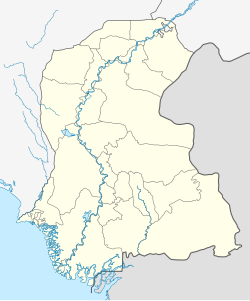| Darya Lal Sankat Mochan Mandir | |
|---|---|
 | |
| Religion | |
| Affiliation | Hinduism |
| District | Karachi South District |
| Deity | Darya Lal (Jhulelal), incarnation of Varuna Deva |
| Festivals | Cheti Chand |
| Governing body | Evacuee Trust Property Board |
| Location | |
| Location | Saddar Town |
| State | Sindh |
| Country | |
| Geographic coordinates | 24°50′56″N66°59′28″E / 24.84889°N 66.99111°E |
| Architecture | |
| Type | Hindu Temple |
| Date established | 300 years old |
Darya Lal Mandir (also known as Darya Lal Sankat Mochan Mandir) is a Hindu temple in Karachi, Pakistan. It is located near Custom House, Saddar Town in the Sindh Province of Pakistan. [1] [2] It is 300 years old. [3] The temple is dedicated to Darya Lal (Jhulelal), [2] who is considered as incarnation of Varuna Deva. [4]




